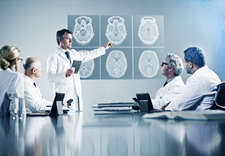News& Information
-
Medical Trends
 Home -> News& Information -> Medical Trends
Home -> News& Information -> Medical Trends
Do we know what causes breast cancer?
Dr. Tong, Fu-zhong M.D.,Ph.D
Many risk factors may increase your chance of developing breast cancer, but it is not yet known exactly how some of these risk factors cause cells to become cancerous.
Hormones seem to play a role in many cases of breast cancer, but just how this happens is not fully understood.
Certain changes in DNA can cause normal breast cells to become cancerous. DNA is the chemical in each of our cells that makes up our genes -- the instructions for how our cells function. We usually look like our parents because they are the source of our DNA. But DNA affects more than how we look.
Some genes contain instructions for controlling when our cells grow, divide, and die. Certain genes that speed up cell division are called oncogenes. Others that slow down cell division, or cause cells to die at the right time, are called tumor suppressor genes. Cancers can be caused by DNA mutations (changes) that "turn on" oncogenes or "turn off" tumor suppressor genes.
Inherited gene mutations
Certain inherited DNA changes can increase the risk for developing cancer and are responsible for the cancers that run in some families. For example, the BRCA genes (BRCA1 and BRCA2) are tumor suppressor genes. Mutations in these genes can be inherited from parents. When they are mutated, they no longer suppress abnormal growth, and cancer is more likely to develop.
Women have already begun to benefit from advances in understanding the genetic basis of breast cancer. Genetic testing can identify some women who have inherited mutations in the BRCA1 or BRCA2 tumor suppressor genes (or less commonly in other genes such as PTEN or p53). These women can then take steps to reduce their risk of developing breast cancers and to monitor changes in their breasts carefully to find cancer at an earlier, more treatable stage. These are discussed in the following sections of this document.
Acquired gene mutations
Most DNA mutations related to breast cancer occur in single breast cells during a woman's life rather than having been inherited. These acquired mutations of oncogenes and/or tumor suppressor genes may result from other factors, like radiation or cancer-causing chemicals. But so far, the causes of most acquired mutations that could lead to breast cancer remain unknown. Most breast cancers have several gene mutations that are acquired.
Tests to spot acquired gene changes may help doctors more accurately predict the outlook for some women with breast cancer. For example, tests can identify women whose breast cancer cells have too many copies of the HER2 oncogene. These cancers tend to be more aggressive. At the same time, drugs have been developed that specifically target these cancers.




